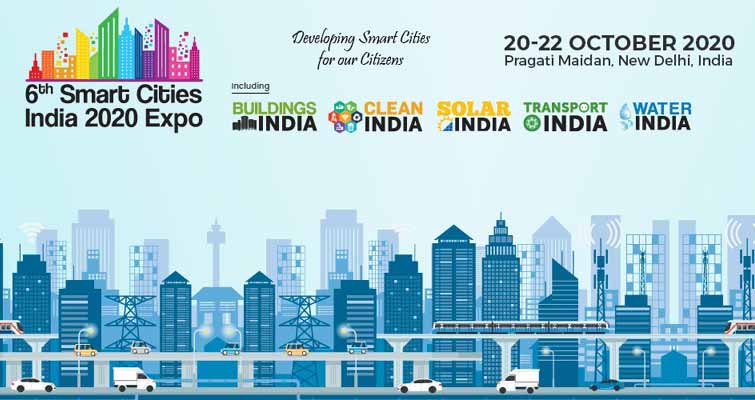- Deliberations on technological interventions used by Smart Cities against COVID-19, & best practices to implement social distancing
- Comprehensive plans to deal with the further spread of coronavirus, and post pandemic approach
- Plans for Green infrastructure, Waste management, Energy efficiency, Mobility and access to clean water during the pandemic
- Are the success stories calling to add more cities to this mission, & will this boost Sister Cities Programme?
New Delhi, 29th May 2020: 6th Smart Cities India 2020 expo and India Trade Promotion Organisation (ITPO) successfully hosted insightful deliberations with industry experts on “How Smart Cities are tackling the COVID-19 Pandemic,” as the webinar shed light on steps undertaken by smart cities across the nation & the future course of action.
The COVID-19 pandemic continues to spread across the globe, and its impact upon human health and the economy is intensifying each day. India’s Smart Cities Mission has invested in a spectrum of technologies that are of great value during this crisis in implementing better management of cities. Deftly moderated by Mr Tikender Panwar, Former Deputy Mayor, Shimla, the webinar was attended by 640+ people as movers and shakers from within the smart city framework elaborated on the challenges, different initiatives and success stories in the wake of COVID-19 contagion.
Ms Avni Gupta, Deputy Director, Smart Cities Mission, MoHUA, Government of India, said, “At the very beginning of the smart cities mission, all smart cities wrote down their proposals on which projects they wanted to focus on, as per the then needs of the cities. Some did choose health projects, nobody anticipating this pandemic back then. Today, Command and Control centres are instrumental in monitoring hotspots and containment zones. Every city is unique and must come up with their own innovative solutions to monitor the COVID-19 spread, and implement solutions that best fit its requirements. The ability to connect with citizens with the help of established infrastructure has been a great strength of smart cities, and we are more than willing to share these tools with others.”
Elaborating on the initiatives taken in the wake of the pandemic, Mr. Sunil Kumar, CEO, Smartcity Bhagalpur said, “Every smart city has developed infrastructure according to its ground reality and unique requirements. With Bihar COVID-19 cases being in low triple digits till two weeks ago, Bhagalpur smart city had taken steps to ensure the well-being of citizens. The city is expecting over 1 lakh migrant labour to return, and we are prepared to receive them, perform thermal scanning, quarantine them for 21 days and ensure proper food distribution. To tackle the future issue of employment for them, we are creating a database and will map them to jobs according to their skillsets. We are monitoring if anyone wants to start something of their own to encourage entrepreneurship, as well as attempting to employ them using MNREGA.”
Discussing the ground efforts in Kerala, Mr. P. Bala Kiran, IAS, CEO Thiruvananthapuram Smart City Ltd. stated, “Having dealt with the NIPA virus in Calicut in 2018, Kerala had a semblance of how to handle COVID-19. As NIPA had a much higher mortality rate of over 85%, we had developed keen ways of contact tracing and employed the same strategy. The Kerala government started a campaign called ‘Break the Chain’ to limit contamination. Over 1.5 lakh people were quarantined in the beginning, educational pamphlets were distributed and sanitisation drives were employed with the assistance of over 2000 self-volunteers. The Trivandrum Corporation created an entire dashboard on its website to monitor progress of its initiatives. The impact can be seen with only 2 deaths here over the last 2 months.”
“Gwalior city was a stalwart in setting up new measures to deal with COVID-19. At the very beginning, we set up 4 helpline numbers with real doctors guiding citizens. But as the coronavirus spread, we expanded to use Command & Control Centres to use WhatsApp video chats to connect with patients or queries,” explained Mr Mahip Tejasvi, IAS, Former CEO, Gwalior Smart City Ltd. “Not only from Gwalior, we even had calls from Delhi and Haryana. Along with a doctor, we created a ‘COVID-19 Suspect Tracing & Patient Management System’ that helped Incident Commanders who were to visit affected areas to fill out forms on the smartphone. This data was received by the Control & Command Centre, which helped efficiently monitor over 5 lakh citizens in the region.”
Stating the importance of these War Room setups in the effort to contain coronavirus Mr R. Srinivasan, EVP & Head, Smart World and Communication, Larsen & Toubro Ltd. said, “The Command & Control Centres have played a significant part in being able to monitor, control and implement solutions in the pandemic, and can be effected in other disaster situations. Crowd alert mechanisms were widely helpful in cities like Mumbai and Bengaluru, and we deployed new tech such as contactless thermal cameras for screening. Healthcare facilities were made available to citizens using during lockdown by generation of QR codes to allow passage. L&T is happy to have been able to contribute to these efforts, and are committed to keep developing these tools.”
About Smart Cities India Expo
Since its inception in 2015, Smart Cities India expo has evolved into Asia’s largest trade fair and conference on the matter. Organized by the India Trade Promotion Organisation (ITPO) & Exhibitions India Group; the expo is scheduled to be held at Pragati Maidan, New Delhi, from 20-22 October, 2020. Conference sessions and exhibition across key verticals constituting smart cities framework including Buildings, Solar, Transport, Water will be held at the event.
For more information, please visit: https://www.smartcitiesindia.com/















